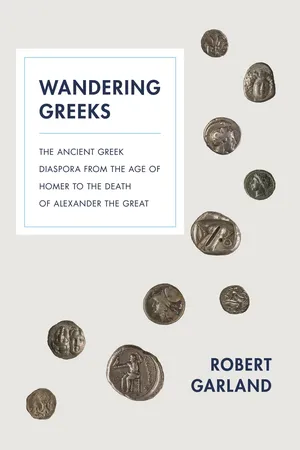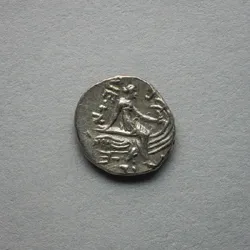![]()
1
PROLEGOMENA
Ancient and Modern Responses to Migration
“Millions of Migrants Flood in and There’s Nothing We Can Do to Stop Them!” screamed the headline in a British tabloid newspaper recently. The metaphor of flooding, which is particularly favored by the popular press, evokes the image of Britannia sinking beneath the waves under the weight of a migrant stampede.
There is, however, nothing novel in the sentiment. In 1601 Queen Elizabeth I had called for the banishment of “the great numbers of negars and Blackamoores, most of them infidels, who are fostered and fed here to the great annoyance of [my] people.” Even so, it was not until 1905 that the British Parliament finally introduced legislation that gave the Home Secretary the power to restrict immigration. The so-called Aliens Act primarily targeted criminals and paupers; an attempt to incorporate a restriction on Jewish immigration under the same act was heavily defeated. This was also the first piece of legislation to provide asylum in Britain for those fleeing from religious or political persecution.
In the United States, too, racism has played its part in the legislative process. In 1790, a few months after the Constitution had been ratified, the Naturalization Act granted immigrant status to any “free white person” of “good moral character” who had been resident in the country for two years. How these persons of good character were to be identified was not spelled out, but they no doubt had to belong to the proper social class. The so-called white person prerequisite remained in force in every naturalization act passed by Congress until 1952. The Chinese Exclusion Act of 1882, which banned Chinese laborers from immigrating to the United States, was repealed only in 1943. It had been fueled by the anxiety that the Chinese were taking jobs from Americans—the persistent fear in a host population toward an energetic immigrant group.
The twentieth century witnessed a dramatic increase in the numbers of refugees, asylum-seekers, and migrants. This came about largely as a result of the rise of communism and fascism and the occurrence of two world wars. Around 1.5 million Anatolian Greeks and 500,000 Muslims became refugees in 1923 as a result of the “Convention Concerning the Exchange of Greek and Turkish Populations,” which the governments of Greece and Turkey cosigned. As many as 12.5 million people were displaced from their homes following the partition of India and Pakistan in 1947. It has recently been determined that at the end of World War II between 12 and 14 million residents of mainly Czechoslovakia, Hungary, and Poland were expelled from their homelands to occupied Germany (Douglas 2012). Some 600,000 Jews fled to Israel from Arab states and from Iran in the late 1940s. Between 5.5 and 8.5 million migrants moved to Britain, France, Italy, Belgium, and Holland from their respective colonies in search of work in the period from 1945 to 1973. Hundreds of thousands of refugees fled to Thailand and Vietnam when the Khmer Rouge came to power in Cambodia in 1975. About 4.6 million Palestinians currently fall under the protection of the United Nations Relief and Work Agency for Palestinian Refugees in the Near East. Some one and a half million Chinese have been relocated from the region in Hubei Province around the Three Gorges Dam, which was begun in 1993 to provide energy for the world’s biggest hydroelectric power plant. At the time of writing more than two million refugees have fled from Syria as a result of the civil war that began in 2011, around half of them children, while another 4.5 million have been internally displaced inside the country according to estimates from the United Nations High Commissioner for Refugees. Not the least troubling consequence of the events of September 11, 2001, has been a global tightening of policies aimed at immigrants, refugees, and asylum-seekers, who are seen as potential threats to national security and as a possible cause of armed terror.
Upheavals in early modern times include the expulsion of the Jews from Spain in 1492, the Moors from Spain in 1609, the Huguenots from France in 1685, the early settlers to America, the émigrés of the French Revolution, and the Loyalists who fled to Canada and the Caribbean at the time of the American War of Independence. In addition, more than half a million Portuguese and Spaniards settled in Central and South America, while about 700,000 British subjects immigrated to the American colonies. It is estimated that between eleven and twelve million Africans were shipped as slaves across the Atlantic from the fifteenth to the nineteenth centuries. Approximately 2.3 million Chinese and 1.3 million Indians traveled to Southeast Asia as contract workers between 1842 and 1900.
Large-scale displacement is by no means an exclusively modern phenomenon. I estimate that well over 100,000 men, women, and slaves were displaced as a result of the Peloponnesian War, half of that number being residents of Attica. Many cities ceased to exist in that period, including Histiaea, Plataea, Thyrea, Torone, Scione, Cyme, Melos, Hyccara, Iasus, and Cedreiae (see appendix E). Some of them were razed to the ground; others were resettled by immigrants. Abandoned settlements were in fact a feature of the Greek landscape at all periods of history. Overall, about seventy-five cities were destroyed in the period covered by this survey, some more than once (Hansen and Nielsen 2004, index 20 [pp. 1363–64]). Plataea held the record, being destroyed three times (in 480, 426, and 373). In forty-two cases the population was massacred and/or enslaved. In twenty-two, the polis underwent dioikismos—that is to say, the survivors were dispersed among the villages out of which the polis had originally been an amalgam.
In addition, many prominent individuals have undergone exile, both voluntary and enforced, including Hannah Arendt, Mikhail Baryshnikov, Napoleon Bonaparte, Marc Chagall, Albert Einstein, Victor Hugo, Richard Wagner, Frédéric Chopin, Sigmund Freud, Thomas Mann, Vladimir Nabokov, Alexander Solzhenitsyn, Thich Nhat Hanh, and Elie Wiesel. The list of those who went into exile in Greek antiquity was equally distinguished (see appendix D).
My own awareness of the issues posed by immigration dates precisely to April 20, 1968, when Enoch Powell, the Conservative Member of Parliament for Wolverhampton South East, delivered his infamous “Rivers of Blood” speech, coincidentally (or not) less than three weeks after the assassination of Martin Luther King. He intended it to be an attack on the Race Relations Act that had been introduced in the same year by the Labour Party. The act had outlawed discrimination on the “grounds of colour, race, or ethnic or national origins” in public places. In so doing, it had also made discrimiantion in housing illegal. Previously it had been commonplace to see advertisements for rented rooms in Britain include the words “No Coloureds” (or “No Irish”). Now such notices were banned.
Britain had experienced considerable immigration from the Commonwealth countries in the postwar years, and Powell saw himself addressing a ticking time bomb. Allegedly quoting what he called “a decent ordinary fellow-Englishman,” he claimed that “in fifteen or twenty years the black man will have the whip hand over the white man”—a highly insensitive and inflammatory phrase if ever there was one, particularly in light of King’s recent assassination. He went on to predict that by the year 2000 there would be five to seven million Commonwealth immigrants and their descendants living in Britain, representing approximately one-tenth of the total population. Powell was a brilliant classicist—he became professor of Greek at the University of Sydney at the age of 25—and he thought fit to end his speech with a Sibylline prophecy from Vergil’s Aeneid (6.87), from which it derived its popular title:
As I look ahead I am filled with foreboding. Like the Roman, I seem to see “the River Tiber foaming with much blood.” That tragic and intractable phenomenon, which we watch with horror on the other side of the Atlantic but which there is interwoven with the history and existence of the States itself, is coming upon us here by our own volition and our own neglect. Indeed, it has all but come.
Powell’s answer to the “problem” of immigration was voluntary reemigration, which was to be facilitated by “generous grants and assistance.” Though many applauded his speech, he was dismissed from the Shadow Cabinet and narrowly avoided prosecution for exacerbating racial tensions. Margaret Thatcher, though certainly not in the same camp as Powell, nonetheless used the word “swamp” to describe an influx of immigrants, and the metaphor is commonplace in what passes for political discourse on the subject. It goes without saying that the scale of permitted immigration remains an extremely contentious issue to this day, both in the United States, the UK, and throughout the world.
There is nothing new in this circumstance. Appeals by asylum-seekers, as well as petitions from would be immigrants, were certainly debated in assemblies throughout the ancient Greek world, and it would be surprising indeed if those debates had not at times become acrimonious and heated. Plutarch in a throwaway line notes that the Athenian lawgiver Solon “observed that Athens was filled with people who were constantly streaming into Attica from elsewhere in order to find security” (Sol. 22.1). Though Plutarch cannot have known what Solon took note of, it is entirely conceivable that some of Solon’s contemporaries did indeed fear that they were being “swamped” by immigrants. It is important to note at the beginning of this survey, however, that to our best knowledge no Greek state ever settled an identifiably “foreign” ethnic minority within its territory. Only very occasionally do we hear of groups of Phoenicians and other non-Greeks residing in cosmopolitan cities such as the Piraeus, Athens’s port, or Syracuse, and they did so in very small numbers. It follows that race would not have been an issue for the Greeks in any discussion about immigration in the same way that it has in the modern world, particularly with regard to those identified as “black.” Nor, so far as we know, did any Greek state implement a policy on immigration or seek to enforce a quota. It just so happened that some states, Athens in primis, were open to immigrants, whereas others, most conspicuously Sparta, were not.
Though the plight of migrants and refugees in the Greek-speaking world would have been similar to their plight today, absent the halting efforts of humanitarian agencies and the distracted gaze of the international community, there are some striking differences. Many people are at least somewhat sensitized to the predicament faced by displaced persons today, whereas the best minds of Greek antiquity show virtually no concern for their welfare. A rare instance of humanitarian concern for refugees on the part of a large number of people is briefly recorded by Diodorus Siculus (19.54.2). When the Macedonian general Cassander, “in his desire for glory,” rebuilt Thebes in 316 following the destruction of that city some twenty years earlier by Alexander the Great, “many Greek cities participated in the sunoikismos [resettlement], both because of their pity for the unfortunate people and because of Thebes’s renown.” We are left wondering to what extent these same cities would have come to the rescue of these unfortunates if they had belonged to a city of no particular consequence. Likewise when the Athenians expelled the Samians and sent their own settlers to the island, the Greek world sympathized with the Samians and provided them with asylum, though perhaps more out of enmity toward the Athenians than sympathy for the Samians (see later, chapter 11).
Another striking difference is that migration in the Greek-speaking world, whatever its cause, often represented a far more radical upheaval in people’s lives than it does today. Describing the moment when her parents became refugees, Vijay Agnew (2005, 6) writes: “The hurried nature of my parents’ departure from Quetta, now part of Pakistan, meant that they carried little with them that was not necessary for physical survival. No albums or pictures of the past survived.” Greek migrants invariably faced the prospect of total severance from the past, and in the absence of the practice of keeping diaries and journals, let alone photographs, the only way that memories could be kept alive was through recitation and story-telling.
The Silence of the Sources
Intensifying Peloponnesian War Sparks Refugee Crisis: Athenian Correspondent Reports That 250 Children Die of Hunger Each Day!
Even if some enterprising Greek had invented the newspaper, I seriously doubt that refugees would have made the headlines. No one to our best knowledge, including Thucydides, who occasionally took note of population movements, ever concerned himself with what we would call today the “global implications” of war, famine, and disease for the thousands of victims of such disasters. This is perhaps all the more surprising in light of the fact that Thucydides was himself exiled from Athens for many years and must have experienced some degree of discomfort, hardship, and prejudice, even though he would have continued to lead a charmed life, like most high-profile exiles. All that he tells us about his exile, however, is that it “gave him the leisure to get a better sense of events”—and thus in effect to become a better historian (5.26.5). Of course, being an exile like Thucydides with wealth and status is a very different experience from being a common refugee. From the perspective of a Greek and indeed Roman historian (a number of whom incidentally went into exile) refugees and other homeless individuals just didn’t merit writing about; or to put it more accurately, they merited a brief mention at most. No historian was particularly interested in recording the sufferings of the undifferentiated masses, and none ever encouraged his readers to dwell on human suffering at length. Why would he? Greek history has provided us with a narrative that privileges the interests and concerns of intellectuals, the well-to-do, and, crucially for our focus here, the settled. It has little to tell us about the dispossessed. The historians belonged to the city élite and assumed that their readers did too. They therefore tell the story from the perspective of a small minority of politically powerful and largely stable cities, about twenty at most. To the extent that we can build up a picture of the dispossessed at all, the data must be culled primarily from the marginalia of history.
“The Athenians crossed over to Euboea again under the command of Pericles and conquered the whole island,” Thucydides reports of the year 446. “While they settled the rest of the island on agreed terms, they expelled the people of Histiaea and occupied their land themselves” (1.114.3; cf. D.S. 12.22.2). And that is that. No further reference to these exiles occurs in his work. They are just one more community consigned to the ash heap of history in a brief, inconsequential statement. Given the bias of our sources, literary as well as epigraphical, it is all too easy to picture the Greek-speaking world from the perspective of the prosperous citizen of a big and thriving city-state. And yet there is an urgent story to be told, and one that has up to now received little attention from ancient historians. Indeed its omission has replicated the silence of our sources.
FIGURE 1 Silver tetrôbolon (four-obol coin) from Histiaea, Euboea, ca. 267–146. The obverse depicts the head of the nymph Histiaea with her hair rolled up and wreathed in a vine. The reverse depicts her seated on the stern of a ship, holding a standard, a trident beneath the hull. The legend reads (HISTI)AIEÔN. The city was destroyed by the Persians in 480 after the Battle of Artemisum. It recovered, became part of Athens’s maritime confederacy, and in 446 defected, along with other Euboean poleis. The rebellion was quickly crushed, and the Histiaeans were deported to Macedonia. A small number remained, however, and at the end of the Peloponnesian War, the city was resettled as Oreos, probably with descendants of the original population (Hansen and Nielsen 2004, 657).
That said I do not mean to pass judgment on Thucydides and the other historians who failed to pay much attention to the struggles of refugees and other migratory peoples. They simply did not see it as their business to chronicle their sufferings. That does not, however, mean that they were indifferent to their plight or inherently lacking in compassion. It goes without saying that we know nothing about their capacity for compassion. What we can say with certainty is that life for the vast majority of people in ancient Greece was extremely tough, that many more people lived on the edge than do today in the West, and that compassion was a luxury that not everyone could afford. As Herbert Butterfield (1931, 16) stated, “The study of the past with one eye, so to speak, upon the present is the source of all sins and sophistries in history, starting with the simplest of them, anachronism.”
Even in the modern world it is virtually impossible to obtain accurate statistics about movements of peoples. A fortiori we cannot begin to estimate the proportion constituted by the migratory population in ancient Greece. Such data as we have are disjointed and piecemeal. To make matters worse, the figures in our sources are inherently unreliable, both because the Greeks could provide only rough estimates of population size and because numbers are frequently transmitted incorrectly in the manuscript tradition. It is clear, however, from what we know about overseas settlements and mercenary service that from the beginning of the historical era, and probably much earlier, Greece had what is called a large “exportable proletariat.” It may have been for this reason that both Plato (Rep. 5.460a, Laws 5.740b–d) and Aristotle (Pol. 7.1335b 19–26) were concerned to restrict the size of the citizen body of individual poleis. It is not until the middle of the second century BCE that we have evidence to suggest that the prospect of a d...


